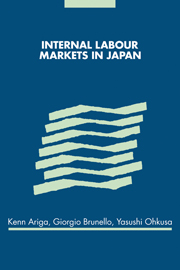Epilog
Published online by Cambridge University Press: 22 September 2009
Summary
As remarked in chapter 5, both Ronald Dore and Masahiko Aoki used Hitachi as a typical example of the Japanese employment system. Hitachi, a major electrical machinery firm, employs roughly 70,000 workers and its sales are over 4 trillion yen. Hitachi's home town is Hitachi City, located in the north of Tokyo, one of the most well known examples of a company town, together with Toyota City and Kadoma (Matsushita's home town). Hitachi is well known for its paternalistic employment system, and a typical Hitachi worker employed in a Hitachi factory located in Hitachi City is likely to be married to an ex co-worker and to live in company housing built by one of Hitachi's subsidiaries and furnished with a large variety of Hitachi electrical appliances. Even after retirement from Hitachi, the worker is going to have a second job at one of Hitachi's subsidiary firms before starting to receive generous company pension benefits. In many cases, sons and/or daughters are also employed by Hitachi.
Hitachi announced that, for the first time in its history, it would register a loss of 260 billion yen for the 1998–9 fiscal year. The company is clearly in deep trouble, and there are several reports that it is now in the middle of wholesale restructuring, including long-term management strategy, the hierarchical structure, and the compensation and recruitment systems.
- Type
- Chapter
- Information
- Internal Labour Markets in Japan , pp. 268 - 270Publisher: Cambridge University PressPrint publication year: 2000

